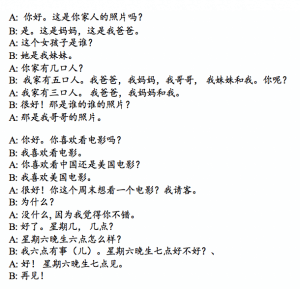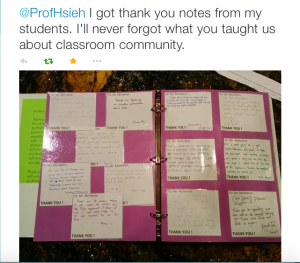It is the end of another semester. This, of course, means, it’s time for another final reflection on the semester.
But this final reflection is a little different than some of my others because this semester is different than others, for more reasons than one might imagine.
In our final synchronous session online together last night, when asked to identify what they were taking away from our class, one of my students shared the following, “I think it’s important to walk the walk instead of just talking the talk. For ex, Dr. Hsieh always talks about compassion and mindfulness, and we actually see it in practice with the flexible deadlines, 2nd chances, etc. Even if I didn’t really turn stuff in “late,” I still really appreciate it, and we don’t necessarily see every professor walking the walk, so to speak.”
Walking the walk.
Over the last 7 years, I have tried my best to always walk the walk.
And I have been blessed to walk the walk alongside some of the best colleagues, leaders, and students in the world.
This semester, our world shifted, in ways that were previously unpredictable. When forced to move our instruction to alternative formats, I could not have asked for better students with whom to engage in remote teaching and learning. I could not have asked for better student teachers with whom to navigate the challenges of figuring out how to complete requirements designed for schools, in remote environments, where every school site and district were responding slightly differently.
We made it through the semester together.
This semester, my world shifted, in ways that were also somewhat unpredictable. I gave a TEDx talk at the end of February, just two weeks before the world as I know it would shut down. I became a mother-scholar 24/7 in the most real of ways. I learned to make memes and expect regular meme recaps of my weekly optional synchronous online sessions with my students.
And, I accepted a new position.
Beginning in Fall 2020, I will be the Director of Teacher Education and Professor of Education at the La Fetra College of Education at the University of La Verne.
I have been relatively quiet about this new journey, out of respect for the shifting ground under my students’ feet. We have been making it, together, and I didn’t want to shift things in a way that might destabilize their learning even more. So, I waited, and asked those who did know about this change, to not announce it publicly.
But last night, at the end of our last class session, I shared the news with students who were shocked but congratulatory. There was even a meme about it, shared prior to the end of class.
Students lingered after I officially ended class, until it was time for me to eat dinner and prepare for a meeting with some amazing former graduate students, where I told them the news as well. They were also shocked but congratulatory. There were no memes, but lots of love.
I am so grateful.
Grateful for the journey of the last seven years. Grateful for the new opportunities on this new path. Grateful to walk the walk of leadership and transformational change. Grateful to walk the walk of leadership as an Asian American woman and teacher educator. Grateful for community that I know won’t be far, even as our roads diverge ever so slightly.
It is almost the end of the semester, but just the beginning of the journey.





